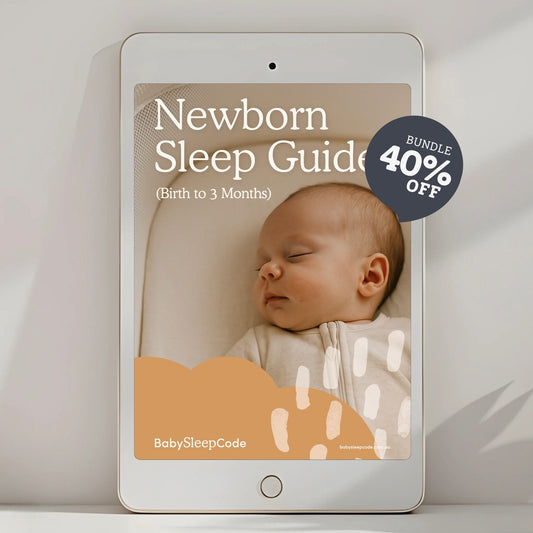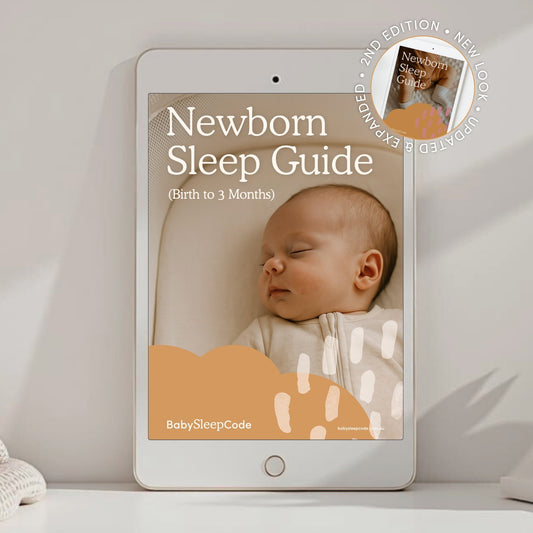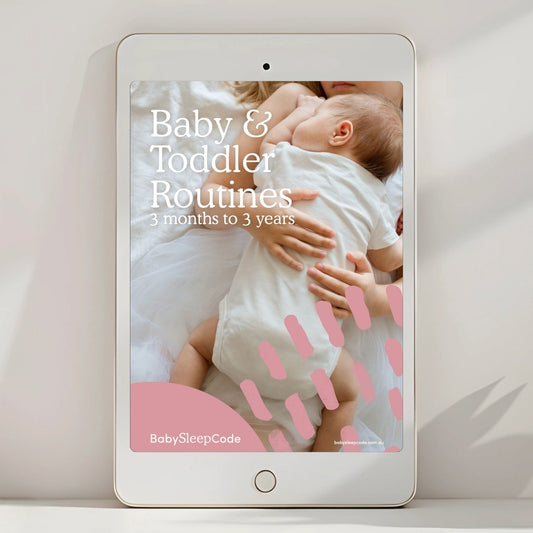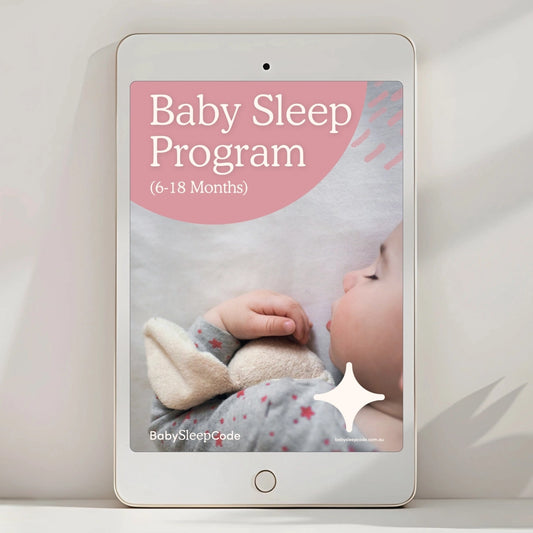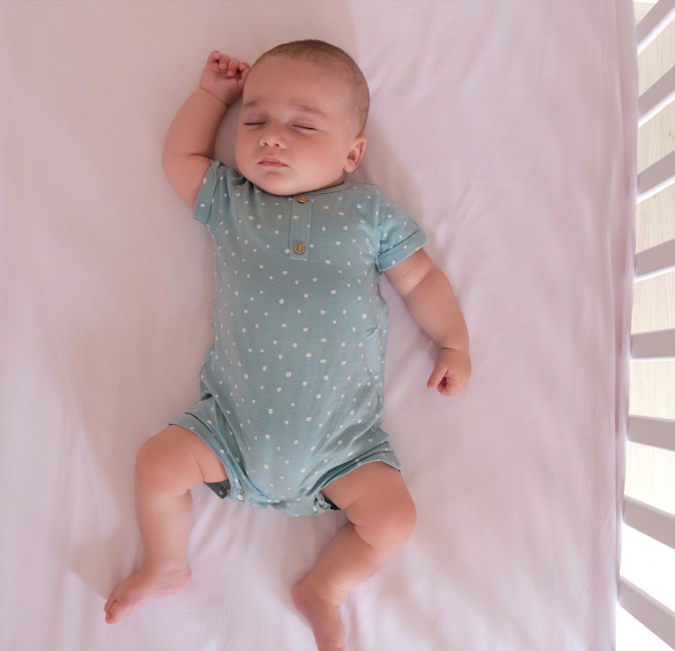When babies cry, it’s natural for every fibre of a parent’s body to react. It doesn’t matter if the cause is a vaccination, a long car ride, or even a simple nappy change — we feel it. This instinct to respond is part of what makes us deeply attuned to our babies. So, when it comes to sleep training, it’s no surprise that many parents worry: Am I doing the right thing?
A quick Google search doesn't always help. Among helpful advice are countless unverified, fear-driven articles warning that letting your baby cry will flood their brain with cortisol and cause lasting harm. It’s important to know: these claims often come from opinion bias, not reputable, evidence-based sources. There is extensive clinical research showing that sleep training, when done thoughtfully and supportively, is not linked to toxic stress or long-term emotional harm [2][8].
So, how do we separate fact from fear? We turn to the research.
What is stress, and when is it harmful to babies?
To help parents, pediatricians, and policymakers better understand how different types of stress impact young children, the American Academy of Pediatrics (AAP) released a comprehensive policy report titled The Lifelong Effects of Early Childhood Adversity and Toxic Stress [1]. This framework outlines three types of stress responses:
-
Positive stress: a brief, mild to moderate activation of the body's stress systems, buffered by a caring adult. Events that can trigger positive stress include "dealing with frustration, getting an immunization, and the anxiety associated with the first day at a child care center." When buffered by stable and supportive relationships, positive stress is a growth-promoting part of normal development. It provides children important opportunities to observe, learn, and practice healthy responses to challenges.
-
Tolerable stress: occurs in response to more serious, non-everyday events, such as a death in the family, divorce, or a natural disaster. With the ongoing support of a trusted adult, children can adapt to these challenges without long-term harm — and in some cases, even experience positive growth.
-
Toxic stress: is caused by "strong, frequent, or prolonged activation of the body's stress response systems in the absence of the buffering protection of a supportive, adult relationship." Examples include chronic neglect, abuse, parental substance abuse, or severe maternal depression. Toxic stress can disrupt brain development and increase the risk of long-term health problems.
So how should we think about where sleep training fits into this understanding of stress?
As Dr. Alice Callahan, scientist, author of The Science of Mom, and expert in child development, framed it: "Is sleep training more like starting daycare, coping with a divorce between the two most important people in your life, or being raised by someone abusing drugs?" [9]
Even when some crying is involved, it is brief and buffered by ongoing love and support. It is not comparable to the sustained, severe experiences that define toxic stress, or even the serious disruptions that cause tolerable stress. When we look critically at the nature of sleep training, its short duration, the caring environment it occurs in, and the presence of a supportive caregiver, it sits firmly within the positive stress category as outlined by the AAP.
If distress is prolonged or overwhelming for the baby or the parent, it’s a sign to pause and adapt because sleep training should not cause ongoing distress.
Does sleep training cause dangerous cortisol levels in babies?
Cortisol is often called the "stress hormone," but it’s essential for survival. It helps mobilise energy, manage blood sugar, and regulate our sleep-wake cycle [3]. In babies, cortisol naturally follows a rhythm, higher in the morning and lower at night [3].
It’s true that cortisol levels can rise during periods of stress, including during episodes of crying. But short, temporary increases, especially when followed by comfort and sleep, are not harmful [1]. Chronic, unbuffered elevation is what research associates with poor outcomes, not brief, supported episodes like those seen during thoughtful sleep changes.
Fragmented sleep and ongoing overtiredness are associated with higher baseline cortisol levels in young children [5], suggesting that chronic poor sleep may pose a greater stress burden over time than brief, supported adjustments like sleep training.
Is crying during sleep training damaging?
A widespread myth claims that “allowing babies to cry hard for more than 5 minutes causes their cortisol levels to rise to dangerously high levels, damaging their brains.”
It’s a frightening idea, but one that does not align with what the research actually shows.
As we've already explored, dips and rises in cortisol are a normal part of healthy biology. Short-term elevations in cortisol, are not harmful to babies when they are supported in a loving, responsive environment [1][3]. Lasting harm is associated with chronic, unbuffered stress over months or years, not temporary, supported experiences like adjusting to learning new skills.
Crying itself is not harmful. Crying is a baby's first language, a way to communicate needs, frustration, and adaptation to new experiences.
If crying for several minutes were inherently damaging, we would expect to see serious consequences from everyday situations where crying is common, like long car trips, overtired evenings, or even during normal efforts to soothe a baby to sleep. Before attempting sleep training, many babies already cry extensively despite parents offering constant holding, rocking, or comforting.
Just like adults sometimes need to express emotions when facing challenges, babies use crying as a natural outlet. Crying is a normal part of emotional expression in infancy and does not cause harm to a baby's brain or emotional development.
What about claims that sleep training causes hidden trauma?
There are clickbait articles and fear-driven posts shared across social media that twist research to fit alarming narratives. A commonly quoted example is the claim that because one study showed that babies’ cortisol levels stayed higher even after they stopped crying during some forms of sleep training, it must mean lasting harm.
However, these claims are based on a single small study by Middlemiss et al. [4]. This study:
-
Took place in a highly artificial, high-stress research setting (not the baby's home), meaning the elevated cortisol could have reflected the unfamiliar environment rather than sleep training itself.
-
Lacked proper baseline comparisons, making it difficult to know whether the cortisol levels observed were unusual or clinically concerning.
-
Only observed short-term cortisol changes over one to two nights, and as already discussed, brief cortisol elevations are not associated with harm in a loving, supportive environment.
Importantly, even the study authors themselves did not conclude that sleep training causes harm or trauma. They acknowledged the limitations of their research and emphasised that more studies were needed to interpret short-term cortisol changes — without suggesting that sleep training is dangerous [4].
In contrast, large, long-term, real-world studies (including five-year follow-ups) have consistently found no differences in attachment, behaviour, emotional health, or cortisol regulation between sleep-trained and non-sleep-trained babies [2][8].
Sleep training, when done within a loving and responsive home environment, does not cause trauma.
If you're wondering specifically about sleep training and attachment, you can read more in our post: Sleep training doesn't come at the cost of the bond with your baby.
Because when it comes to helping your baby (and yourself) thrive, you deserve information grounded in science, not fear.
Sleep, stress, and the whole family's wellbeing
Sleep deprivation doesn’t just affect babies. It affects the whole household. Research shows that poor sleep is a strong predictor of parental mental health challenges, including postpartum depression [7].
When parents are chronically exhausted, it's harder to be emotionally available, patient, and responsive, the very ingredients that nurture secure attachment.
If your baby only sleeps in your arms and wakes upset the moment they’re put down, that can be stressful for both of you. Long-term sleep deprivation impacts everyone’s ability to regulate emotions, including babies. In fact, babies and children who sleep more tend to have lower baseline cortisol levels and better emotional regulation overall [5].
Families who support their baby's sleep (whether with gradual changes or faster approaches) often find that better sleep restores everyone's capacity to connect, enjoy each other, and thrive.
"Sleep training changed everything for us. I feel like a better mum because I’m not running on empty. My baby is happier and so am I." — Aimee C.
Sleep changes can be hard at first, but growth happens through the challenge
Like it is when learning any other new skill, like crawling, talking, or walking, it can feel challenging at first. But as your baby practices and gains confidence in their ability to fall asleep more independently, sleep becomes easier, more predictable, and more restorative for everyone.
Changing sleep habits can be an adjustment, but it’s not a harmful one.
It's also important to know: sleep training doesn't have to mean "cry it out." At Baby Sleep Code, we take a holistic approach, helping you understand how to absolutely prime your baby for great sleep before making any changes to how they fall asleep. Our goal is for your little one to feel secure, supported, and to genuinely love sleep.
"Finally sleeping! Loved the gentle approach option and after following the guide religiously our 10-month-old is falling asleep independently." — Emma
"We went from contact napping and waking every 45 minutes to a baby who self-settles and sleeps through the night. Best thing we ever did!" — Georgia
Check out our range of downloadable sleep guides, or book an online 1:1 consult for personalised support.
References:
[1] Shonkoff, J.P., Garner, A.S., & the Committee on Psychosocial Aspects of Child and Family Health. (2012). The Lifelong Effects of Early Childhood Adversity and Toxic Stress. Pediatrics, 129(1), e232–e246.
[2] Hiscock, H., et al. (2008). Long-term mother and child mental health effects of a population-based infant sleep intervention: cluster-randomized, controlled trial. Pediatrics, 122(3), e621–e627.
[3] Santiago, L.B., Jorge, S.M., & Moreira, A.C. (1996). Longitudinal evaluation of the development of salivary cortisol circadian rhythm in infancy. Clinical Endocrinology, 44(2), 157–161.
[4] Middlemiss, W., et al. (2012). Asynchrony of mother–infant hypothalamic–pituitary–adrenal axis activity following extinction of infant crying responses induced during the transition to sleep. Early Human Development, 88(4), 227–232.
[5] Tikotzky, L., et al. (2010). The impact of infant sleep on the cortisol response to stress in children. Behavioral Sleep Medicine, 8(4), 194–208.
[6] Gradisar, M., et al. (2016). Behavioral interventions for infant sleep problems: A randomized controlled trial. Pediatrics, 137(6), e20151486.
[7] Dorheim, S.K., et al. (2009). Sleep and depression in postpartum women: a population-based study. Sleep, 32(7), 847–855.
[8] Price, A.M.H., et al. (2012). Five-year follow-up of harms and benefits of behavioral infant sleep intervention: Randomized trial. Pediatrics, 130(4), 643–651.
[9] Callahan, A. (2013). The Science of Mom: A Research-Based Guide to Your Baby’s First Year. Johns Hopkins University Press.


